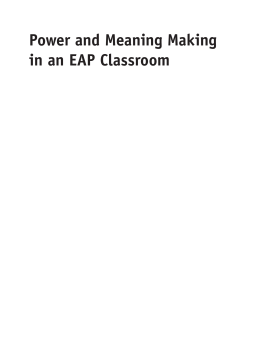
Additional Information
Book Details
Abstract
This book examines how critical literacy pedagogy has been implemented in a classroom through a year-long collaboration between the author (a researcher) and an EAP teacher. It details the teacher's introduction to functional grammar and accompanying critical literacy approaches to EAP, and her growing critical language and discourse awareness of power and meaning making in the classroom. The book traces her evolving classroom practices and addresses how powerful discourses in social circulation found their way into the classroom via the curriculum materials the students encountered. The main themes of the book are threefold: narrowing the divide between critically-oriented researchers and practitioners; how critical literacy is actually implemented in a teacher's classroom; and how people (students and the teacher) engage in and with the representations and discourses of the everyday world that include neoliberal globalization, racial and cultural identities, and consumerism. It will be of interest to both researchers and practitioners for the ethnographic and pedagogical issues it raises as well as its accessible theoretical frameworks illustrated by relevant classroom interactional data, mediated, multimodal and critical discourse analysis.
Christian W. Chun is Assistant Professor in the Department of English at the City University of Hong Kong. His research interests include English for Academic Purposes, critical literacies, social-semiotic approaches to language education, visual culture and linguistic landscapes.
Chun's fresh and engaging exploration of how an EAP teacher implemented functional grammar and critical literacy in her classes is an important contribution to the EAP literature. His discussion of the collaboration between himself and the EAP teacher offers an intimate portrait of the challenges of translating newly-learned theoretical constructs into everyday classroom activities.
This is an exemplary study of an EAP classroom. It is a critically reflexive and refreshing account of what it means to be an EAP teacher and what we do in our classrooms. The writing is both engaging and thoughtful and I highly recommend it.
Christian Chun's book is a true must for anyone involved in EAP teaching and researching, for anyone who is captive to the dilemmas of neoliberal higher education.
Catalina Neculai, Coventry University, UK
Through a critical ethnographic study of one teacher's evolving practice, Christian Chun challenges us to interrogate the nexus between neoliberal social and economic forces and the daily classroom realities of an EAP teacher and her students striving to make and share meaning in what has become the higher education marketplace.
This book is an important contribution to the research of critical pedagogies in English language education; it will doubtlessly be useful for language education researchers who intend to conduct classroom research with practicing teachers, and for EAP instructors interested in understanding how critical pedagogies can empower their students in learning the language while developing their critical literacy skills.
Kongji Qin, Michigan State University, USA
Table of Contents
| Section Title | Page | Action | Price |
|---|---|---|---|
| Contents | v | ||
| Figures | vii | ||
| Acknowledgments | ix | ||
| Series Editors’ Preface | xiii | ||
| 1 Introduction | 1 | ||
| 2 An EAP Classroom | 25 | ||
| 3 Exploring the Making of Meanings | 41 | ||
| 4 The Multimodalities of Neoliberal Globalization Discourses in YouTube Videos | 68 | ||
| 5 Engaging with Neoliberalization Discourses, Part 2: Summer Term Class | 96 | ||
| 6 Who is ‘Jennifer Wong’?Multiculturalism and the Model Minority Consumer | 123 | ||
| 7 Bringing the Political into an EAP Classroom? | 153 | ||
| 8 The Everyday Life of an EAP Classroom | 181 | ||
| References | 199 | ||
| Index | 210 |
